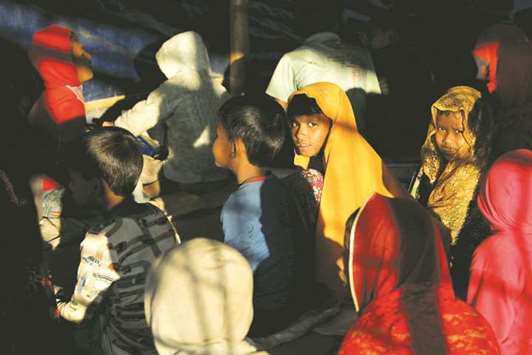Health workers in Rohingya refugee camps in Bangladesh are struggling with a shortage of medics able to administer antitoxins to patients infected with diphtheria that has killed nearly two dozen people, aid officials said.
Neighbouring Myanmar’s military cracked down on Muslim Rohingya from Rakhine state following Rohingya militant attacks on an army base and police posts on August 25.
More than 650,000 Rohingya have fled mainly Buddhist Myanmar to Bangladesh since August, on top of more than 200,000 who fled earlier, according to latest United Nations data.
Doctors Without Borders (MSF), the lead agency dealing with an outbreak of the bacterial disease in camps sheltering the Rohingya, has treated around 2,000 patients in the past few weeks and is receiving around 100 new cases daily.
The World Health Organisation (WHO) describes diphtheria as a widespread, severe infectious disease with epidemic potential and a mortality rate of up to 10%.
MSF has called diphtheria a disease “long forgotten in most parts of the world thanks to increasing rates of vaccination”.
MSF has managed to provide antitoxins to only around 12 patients daily due to the lack of trained medics, said Crystal van Leeuwen, an MSF emergency medical coordinator now in Cox’s Bazar where the refugee camps are located.
“Once we do have enough people and other organisations start to administer as well, we may get into a situation where we don’t have enough antitoxins anymore,” she told Reuters by phone yesterday.
“It’s a double-edged sword. We need both the human resources to administer it, and we need more antitoxins at the same time.”
According to a UN report in February, supply of diphtheria antitoxin serum has been limited for many years and the shortage is expected to continue through 2017.
The British government said yesterday it was sending a team of more than 40 doctors, nurses and firefighters to Cox’s Bazar for six weeks to deal with the diphtheria outbreak following a request by the WHO and Bangladesh government.
The refugees live in densely populated camps and shacks made from bamboo and plastic sheets, with poor access to clean water, sanitation and health services.
The United Nations’ independent investigator into human rights in Myanmar has called for international pressure on China and Russia to try to get them to oppose human rights abuses in Myanmar.
UN special rapporteur Yanghee Lee, who was last week barred by the Myanmar government from visiting the country, singled out China and Russia because they had failed to back some moves in the UN
aimed at trying to halt the Myanmar military’s crackdown on the Rohingya Muslim community in Rakhine province.
“I’d like to ask the international community to continue to work with China and Russia to persuade them to stand on the side of human rights,” Lee told Reuters in an interview.
Neither has joined the United States, the European Union, and the Organization of Islamic Cooperation in condemning the crackdown that has led to the exodus of what aid agencies estimate to be 655,000 refugees into Bangladesh.
In response to Lee, Chinese foreign ministry spokeswoman Hua Chunying said that “external actors” adding pressure over human rights will not help to resolve the issue, and may make it more complicated.
This would not be in the interests of Myanmar, its neighbours or the international community, she said at a regular news briefing in Beijing yesterday.
“We hope that countries or individuals external to the issue can create a positive environment that is more conducive to Myanmar resolving the issue for themselves,” Hua added. The Russian foreign ministry did not respond to a request for comment.
The Russian government has previously warned against interfering in Myanmar’s internal affairs. Russia’s ambassador to Myanmar, Nikolay Listopadov has said it is “against excessive intervention, because it won’t lead to any constructive results.”

Rohingya refugee children study at the Burma Para refugee camp near Cox’s Bazaar, Bangladesh.
